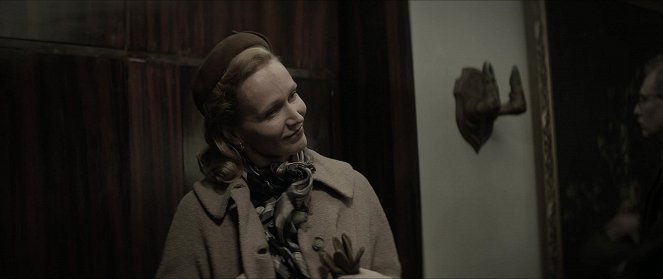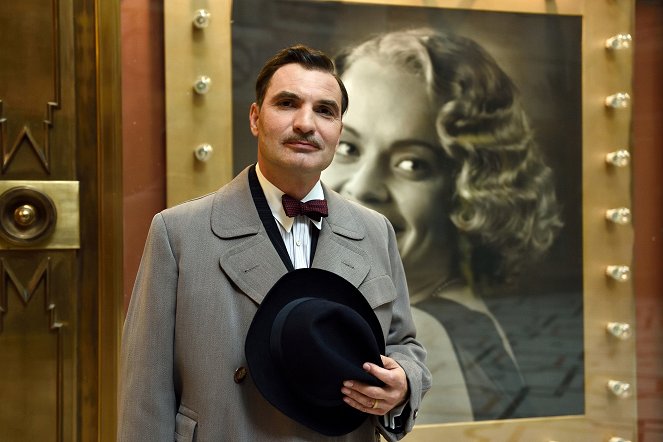Reżyseria:
Jan HřebejkScenariusz:
Petr JarchovskýZdjęcia:
Bartek CierlicaMuzyka:
Petr OstrouchovObsada:
Aňa Geislerová, Ondřej Sokol, Martin Finger, Klára Melíšková, Gabriela Míčová, Josefína Marková, Samuel Budiman, Lenka Krobotová, David Novotný (więcej)Opisy(1)
Trzy siostry: Vilma, Ela i Bedřiška mieszkają z dwójką dzieci. Ich mężowie zostali wywiezieni do obozów koncentracyjnych za działalność w ruchu oporu. Lekarz Jiří, przyjaciel Jindřicha, męża Vilmy, wdzięczny kolegom z konspiracji, że go nie wydali w trakcie przesłuchań, pomaga samotnym kobietom przez całą wojnę. Z czasem między Vilmą i Jiřím budzi się uczucie. Otrzymują wiadomość, że Jindřich umarł. Niespodziewanie jednak wraca tuż po zakończeniu wojny. (Żółty Szalik)
(więcej)Materiały wideo (5)
Recenzje (7)
A pierced melodrama with an amputated head. For ten minutes I laughed at the idea of Ondřej Sokol and character acting, and during the rest of the unjust runtime I meditated on how in 2017 the once sensible creative duo was able to make something so weak. So: in the first 10 minutes, about five times as many things happen compared to the rest of the movie. For an hour and a half, we watch the bloodless variation of Chekhov, from which the protectorate banality feels like torturous boredom, which is only diversified by Uncle Jiří's unintentionally pedophile etudes and moments when Sokol and Geislerová tell the men and girls that they feel something for each other, and that it’s probably not because Jiří is a faithful family friend. The lack of plot of some of the family sessions is also repeated by voiceover. The virginal nature of one house with three sisters is disrupted by the invasion of Sabina Remundová, which was originally probably intended for the unrealized film The Sun, Hay, and the Protectorate. When it seems that we will only be watching ketamine family sediments with terribly plank speeches for 130 minutes, a big drama strikes, because someone will return who the characters are not waiting for, but the viewer is waiting for him, because he probably knows it's “Kodet from Cosy Dens, but younger". However, Jarchovský successfully prevents the impending drama by letting one of the characters die of typhus, which the other character tells us through a beautiful voiceover, in which the verbs end in a pleasant archaic. This distorted structure with many spots with zero plot leads to the speculation that Hřebejk is trying to direct art magic of ordinariness, like we know from Hirokazu Koreeda’s films. His directing is nevertheless totally cerebral and no, I don't consider the naive motifs and the occasionally shaky filming to be a directing concept. When it seems that the war, which subjectively lasts 30 years, is finally over and the film with it, a wandering scene reminds us that there are still dilemmas that the rest of the trilogy must resolve. Family chronicles are meant to remind us of the burden of passing time. Gardening reminds us that there is nothing worse than when, instead of film time, the viewer feels the existential weight of his ass in a cinema seat. For me, this is the new bottom for the creative duo, who once managed to film a similar genre with ease and humor. [yes, of course it's fine in terms of craftsmanship and in the first tolerable 15 minutes I give them the originally denied one star. I am, like Ondra Sokol, a "good person"]
()
A very weak and shallow film, suffering both for being the first of three (it’s rather more of an introductory film that only presents the characters and prepares the setting for the rest of the story), and for a number of film shortcomings at almost all levels, sometimes outright beginner mistakes, which is really shocking for Hřebejk. The story is terribly undramatic and lack conflict, and therefore feels very lazy, while any hint of at least a bit of interesting plot is always swept from the table right from the start. There is maybe about an hour of plot in the film and the rest is filler made up of purely "empty" and non-story passages, which slow down the film even more and unnecessarily stretch it beyond the limit of its carrying capacity. The chosen mood of the film, combining two completely incompatible genres - chaste melodrama and a beaming comedy in the style of Cosy Dens, trying in vain for similarly penetrating funny one-liners, really doesn’t work. You may laugh a few times, but nothing will affect you emotionally in the film in any way. The last hopes die at the end, when the film deals with the death of one of the main characters in a shameful way with a single sentence, moreover in voiceover and out of the picture, which truly is serious amateurism. The actors are great and the period styling is in fact excellent, but these are not enough to carry the film. The connection to Cosy Dens is minimal and rather disruptive, but we will what happens in the next episodes.
()
Rather than a classic film trilogy, it looks more like it’s going to be a film series with Garden Store. Otherwise, I can't explain why Hřebejk and Jarchovský would present so many characters in this film. Not only do they not affect anything the plot, but they instead disappear from it and it does not matter at all. I hope we get to see them next time. Otherwise, I liked A Family Friend, and particularly Martin Finger confirmed how great an actor he is. Aňa Geislerová and Ondrej Sokol worked great together and I have nothing against the long Christmas scene, because it felt pretty authentic and had the atmosphere that it was supposed to have.
()
I don’t want to be ungrateful. I really appreciate it that Cinemart invited me to the Lucerna Cinema for the preview. I was excited to accept that invitation even though the Lucerna Cinema isn’t exactly around the corner from where I live. You see I was looking forward to a new Czech film because I generally really like Czech films. However, I was quite horrified when after the first scene involving the Sparta Prague football team fan David Novotný the screenwriters disappointed me by the illogical encounter with the three sisters who at first sight had nothing in common with Novotný’s gardening shop. I saw it that way because the second scene lasted for about half an hour and all that time I could not figure out where the movie was headed to and what the story was supposed to be. In this case, the screenplay was a terrible disappointment. It took me about an hour to find out that the story was much simpler than it seemed at first sight. And since the story is simple, the movie simplifies the atmosphere as well. The film does not show the heaviness of those times at all. For instance, at the beginning it provides no explanation for why Finger and Macháček ended up in jail. Sure, it’s somehow related to the resistance… but how? They you get hit in the face with Sabina Remundová, who is pulling the smartest auntie around act – I don’t hold it against her, but it doesn’t fit into the movie at all. The same goes for Ondřej Sokol – given how big his part is, he doesn’t seem too serious about it, so his character flows through life and then we say goodbye to him at the end. No emotions whatsoever. I actually found the movie as empty as the exteriors, which look great thanks to the camera work, but still incredibly fake. How did this funcionalist house suddenly appear in the middle of the field? I don’t know… you get excited about something, but then you get fairly disappointed. The movie is at least saved by the child actors, who made the film more bearable with their humor, or the three sisters – the actresses did a standardly good job portraying these. If nothing else, these things at least made me happy. I hope to God that the two sequels are much better.
()
I spent a lot of time thinking about how I was going to enjoy Garden Store: A Family Friend. I missed the early premiere, and I missed the book trilogy signing in Prague, so I thought there was no point in rushing anything. I was more focused on the recent Aňa Geislerová films because of the long break between them, but fortunately, the last two followed each other quickly. We are going to be spending the whole year with Garden Store, that's for sure. The melancholic war melodrama presents a sequence of familiar scenes, but that's only because the collective memory retains similar family stories in each of us. The beautiful, reserved romance belongs to Aňa Geislerová, who greatly surpasses her partner Sokol in acting. It's a joy to watch Aňa in yet another war story, which has brought her protagonist gracefully going through a series of emotional upheavals. In terms of the other acting creations, I would overlook the traditionally weak and repetitive performances of Míčová and Melíšková, which are fortunately offset by the intuitive miniatures Krobotová and Remundová. The child roles are of course cute. Overall, I'm very happy with the concept of Garden Store. Even the genre distinction makes sense - The Protectorate is told as a melodrama (Hřebejk is well aware of its nostalgic value, as well as the quality cinematography of the time in the style of J. A. Holman), the post-February break as a chilling drama (no commentary needed), and the thaw will be a comedy. And that's just the way it was - or mirroring the pulse of history with genre - and I can only welcome that. And I do welcome it.
()



Reklama